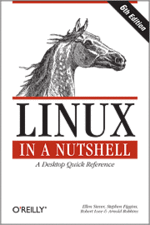ROSE Blog Interviews: Ellen Siever, co-author of Linux in a Nutshell

ROSE Blog: Rikki's Open Source Exchange

The latest release of O'Reilly's well-respected Linux in a Nutshell book recently hit bookstore shelves. Co-author Ellen Siever answers the ROSE Blog interview questions:
Q: Who are you?
A: I'm Ellen Siever. For many years I was a mainframe assembler language programmer, working at several companies in the Boston area. Later, I joined O'Reilly, where I stayed for almost 8 years in various capacities, including working in the tools group and as a writer and editor. Since leaving O'Reilly, I've continued to freelance for them, working on a book about the X Window System that never saw the light of day and on Linux in a Nutshell (which I've been an author of since the second edition). I'd used Unix before working at O'Reilly, but it was there that I got interested in Linux and open source.
Q: What are you currently doing in open source?
A: I've just finished working on the sixth edition of Linux in a Nutshell, and I regularly use Linux and other open source software, particularly OpenOffice.
Q: You're speaking to a group of women from other fields who are considering switching careers. Why should they consider moving into an open source-related career? What should they know about the open source environment to prepare them for the transition from a different field?
A: Switching careers is not always an easy thing to do, especially in a difficult economic environment. Open source is a particularly good choice because it is so open, because there is so much variety, because it's still a relatively young field and is growing, and because you can jump in on a volunteer basis to get started. Install Open Source software on your computer and experiment with it; look into the source code if you're a technical person and see how it's put together. Find a project that appeals to you and volunteer. You'll get experience, you'll provide a service, and you'll get to know other people in the open source community. This applies to everyone, female or male.
For women, I'd say that open source can sometimes feel like a men's club, and you might want to find other women to network with. One group that I know of, for example, is LinuxChix. On their web page, they describe the group and also have a list of other organizations for women working in open source. Also try social networks like Twitter or Facebook to connect with other open source women.
Q: You're speaking to a group of high school students (male and female). Why should they consider exploring career options in open source?
A: My answer to that is very similar to the previous one. One difference is that high school students have a longer timeframe and therefore have more time to explore different options. Again, a good way to get started is to experiment with the software, examine the source code, and find a project to volunteer for.
Check back later this week for my interview with Lawrence resident and Linux in a Nutshell contributor Stephen Figgins.
comments powered by Disqus